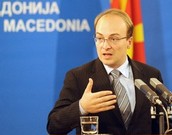
Macedonian Foreign Minister Milosevski announcing the recognition of Kosovo
After the big vote in the UN General Assembly, the Macedonian Government recognized Kosovo. Despite the bitter reactions of Belgrade, Skopje thinks its decision will strengthen peace and stability in the region
On the evening of October 9, the Macedonian government recognised Kosovo. The government decision followed by several hours a parliamentary resolution recommending recognition.
The move was coordinated with the Montenegrin government, which recognised Kosovo several hours before Macedonia did.
The decision was greeted warmly in Kosovo and celebrated by the Albanian political forces in Macedonia. Belgrade received the news with bitterness.
Macedonian ambassador to Serbia, Aleksandar Vasilevski was promptly declared persona non grata and was asked to immediately leave the country. The Montenegrin ambassador to Belgrade shared the same fate.
Macedonian authorities said they would not exercise reciprocity and that the Serbian ambassador is welcome to stay and continue his work in their country.
Serbian ambassador to Skopje, Zoran Popovic, called upon the Macedonian government to reconsider its decision to recognise Kosovo.
The United States, as well as the United Kingdom, welcomed the decisions by Macedonia and Montenegro.
"This will ease the region's integration into Euro-Atlantic structures," said US State Department representative Sean McCormack.
"The recognitions are welcome," said UK Foreign Minister David Miliband, "As neighbours, their decisions to build relations with independent Kosovo, while retaining relations with Serbia, is the way forward for the region."
The EU Ambassador to Skopje, Ervan Fuere, avoided much comment on the issue. "Recognition is each country's sovereign decision," he said briefly, following Brussels' official policy on the issue.
Kosovo officials in Pristina received Skopje's decision with gratitude.
"This strengthens peace and stability in the region. It further clarifies the political reality in the region, and it helps the integration of our countries into the EU and NATO," stated Kosovo Prime Minister Hashim Taci.
People in Kosovo also enthusiastically welcomed the recognition by Macedonia. "This is very important," said a Kosovar, "If your neighbour does not recognise you, how can you expect to be recognised by someone far away?" Some commented they expected the recognition to come earlier.
Belgrade was furious. Asked why Macedonia's Ambassador was expelled but not the ambassadors of countries such as Croatia, Hungary, and Bulgaria, who recognised Kosovo earlier this year, Serbia's Ambassador Popovic said this was because the recent vote in the UN General Assembly "has radically changed the reality concerning the status of Kosovo."
In an interview a day after the recognition, a Socialist Party of Serbia member who also serves as First Deputy Prime Minister and Interior Minister, Ivica Dacic, said, "If we were to hit each other where it hurts the most, we should start calling you FYROM."
Macedonia's procrastination with the recognition of Kosovo, despite the strong international pressure and the demands of the Albanian political forces in Macedonia, primarily came from fears of possible worsening of economic ties with Serbia.
"They will be angry, but only for a few days," said Menduh Taci, the leader of DPA, a Macedonian ethnic Albanian party, "Even they understand the reality."
Experts said the decision was forced, but that it would nevertheless have a stabilising political effect on the region. Given the international pressure and the Albanian factor in the country, Macedonia simply had no choice, say analysts.
"Although it would worsen our relations with Serbia over the short term, and this is something we could not possibly avoid, the decision will help stabilise the region," said Dimitar Mircev, university professor and former ambassador.
"I know some citizens may be disappointed with this, and I understand how they feel, but what we did because we feel it was in our national interest," said Prime Minister Nikola Gruevski.
Although the fear from possible economic consequences is present, experts assure Macedonia that Belgrade's interest would not be advance by reaching for such measures.
Belgrade was angry the recognition took place practically hours after the big vote in the UN General Assembly, but Skopje essentially respected Belgrade's wish not to do anything that might affect the process in the UN. It also abstained from voting, which went in favour of Serbia's motion.
It does not take much analysis to know that the United States sponsored and coordinated the recognitions. The US Defence Secretary was in Ohrid, Macedonia at a regional meeting just a few days before Macedonia and Montenegro proceeded with recognition.
Expressing support for the resolution proposed by the Albanian political parties, a parliamentarian from the ruling party in Macedonia, VMRO, Silvana Boneva, clearly stated that Macedonia was doing this to please the US.
"For us, the support by the US, which is at the same time the major guarantee and promoter of regional stability and security, is an important indicator, and this determined our position on the future of Kosovo," said Boneva during the parliamentary debate on the resolution.
Opposition social democrats (SDSM) did not vote on the resolution. The ethnic Albanian party, DUI of Ali Ahmeti, who were former coalition partners of the social democrats (and currently of VMRO) in the 2002-2006 government were disappointed with SDSM's abstention.
A DUI official asked, "How would they have felt if we abstained from voting on the resolution on the Macedonian minority in Greece?"
Experts in Belgrade also do not expect major deterioration in Serbia's relations with Macedonia over the medium term. According to them, there is understanding by the Serbian public that Macedonia did not have much choice.
Macedonia wants good relations with both Serbia and Kosovo. With the border with Kosovo now demarcated, and with Pristina recognised by Skopje, the prospect indeed seems better for the region. One hopes that Belgrade should also have the strength to understand that.






